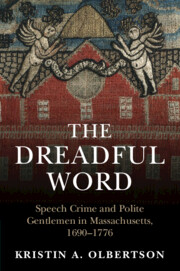4 - Civility
Published online by Cambridge University Press: 03 March 2022
Summary
Contempt, cursing, and defamation all actively caused harm to others and threatened to destabilize social hierarchies of gentility. As politeness became the political language that enabled the exercise of power by elites and allowed them to recognize each other as the rightful possessors of public authority, criminal prosecutions of uncivil speech helped define political roles and relationships. Contempt prosecutions punished impolite speech from the lower orders, but the law also rewarded appropriately submissive speech (such as apologies) from them. The fact that these negotiations occurred exclusively among men reflects how both the politeness regime and the king’s peace itself were increasingly marginalizing women. The vast majority of those prosecuted for cursing were men of relatively low social status; this offense was understood to threaten the polite ethos and the civil order. Defamation became in the eighteenth century a crime of the lower orders, while polite gentlemen channeled their own defamatory impulses into a highly specific and legally protected written form: satire.
- Type
- Chapter
- Information
- The Dreadful WordSpeech Crime and Polite Gentlemen in Massachusetts, 1690–1776, pp. 127 - 180Publisher: Cambridge University PressPrint publication year: 2022



